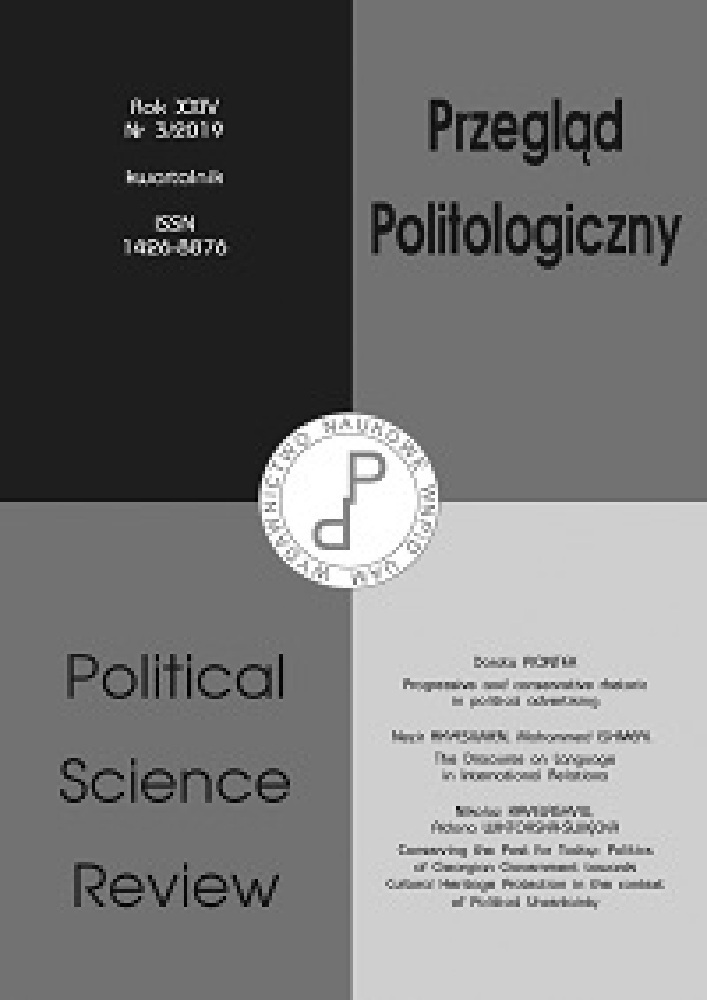Abstract
In this article we make an attempt to join a discussions on the political and social activity of young people in contemporary polyarchies. On the basis of the assumption that the condition for the active fulfilment of civic functions are cognitive skills and the ability to communicate which the individual improves in the education process and through participation in social phenomena, we are trying to find the answer to the following questions: how is participation perceived in today’s polyarchies, what can be the determinants of youth’s political and social involvement, why do European international organisations – the Council of Europe and the European Union – take measures to activate European youth. In the first part of the article, we focus on democratic participation and try to recognise its role in selected models of democracy. Then we analyse selected aspects of youth electoral absenteeism. We cite examples of the activities of the Council of Europe and the European Union in the field of the youth democratic (civic) activation with an indication of the reasons for this activity. Finally, we point to the relationship between the political and social participation of young people and the condition of modern European polyarchies.
References
Barber B. (1998), A Passion for Democracy: American Essays, Princeton University Press, Princeton.
Barber B. (1984), Strong Democracy, University of California Press, Berkeley.
Beyme K. von (2005), Współczesne teorie polityczne, Wydawnictwo Naukowe Scholar, Warszawa.
Boryń M., Duraj B., Mrozowska S. (eds.) (2014), Polityka młodzieżowa Unii Europejskiej, Wydawnictwo Adam Marszałek, Toruń.
Braud P. (1995), Rozkosze demokracji, Wydawnictwo Naukowe PWN, Warszawa.
Chodubski A. (2003), Grupy interesu w ujęciu historycznym, w: Grupy interesu. Teoria i działanie, red. Z. Machelski, L. Rubisz, Wydawnictwo Adam Marszałek, Toruń.
Council of the European Union, Resolution of the Council of the European Union and the Representatives of the Governments of the Member States meeting within the Council on a framework for European cooperation in the youth field: The European Union Youth Strategy 2019–2027, Official Journal of the European Union, C456/2018.
Dahl R. A. (1985), A Preference to Economic Democracy, University of California Press, Berkley–Los Angeles.
Dahl R. A. (2000), O demokracji, Społeczny Instytut Wydawniczy Znak, Kraków.
Dahl R. A., Stinebrickner B. (2007), Współczesna analiza polityczna, Wydawnictwo Naukowe Scholar, Warszawa.
Dalton R. J. (2002), Citizen Politics: Public Opinion and Political Parties in Advansed Industrial Democracy, Chatham House Publishers, New York.
Dalton R. J., Klingeman H.-D. (2010), Obywatele a zachowania polityczne, w: Zachowania polityczne, pod red. R. J. Dalton, H.-D. Klingeman, Wydawnictwo Naukowe PWN, Warszawa.
Ellis A., Gratsche M., Pammett J. H., Thiessen E., Balinov I., Burges S. W., Chrabolowsky L., McGrane D., Hocman J., Lemón Omelko S. (2008), Aktywizowanie wyborców. Inicjatywy z różnych krajów świata, Instytut Spraw Publicznych, Warszawa.
European Commission (2), Communication from the Commission to the European Parliament, the European Council, the Council, the European Economic and Social Committee and the Committee of the Regions Engaging, Connecting and Empowering young people: a new EU Youth Strategy, COM/2018/269.
European Commission (2), Situation of the young people in the European Union, Commission Staff Working Document, SWD (2018) 169 final of 22.05.2018.
European Commission/EACEA/Eurydice, Citizenship Education at School in Europe – 2017.
Fyfe I. (2009), Researching Youth Political Participation in Australia. Arguments for an Expanded Focus, “Youth Studies Australia”, vol. 28, no. 1.
Gutmann A. (1987), Democratic education, Princton University Press, Princton.
Habermas J. (1999), Teoria działania komunikacyjnego, t. I: Racjonalność działania a racjonalność społeczna, PWN, Warszawa.
Habermas J. (2002), Teoria działania komunikacyjnego, t. II: Przyczynek do krytyki rozumu funkcjonalnego, Warszawa.
Hedl D. (2010), Modele demokracji, Wydawnictwo Uniwersytetu Jagiellońskiego, Kraków.
Juchacz P. W., Malitowska A. (2012), O filozofii publicznej i edukacji demokratycznej, „Filozofia Publiczna i Edukacja Demokratyczna”, t. 1, nr 1.
Kijewska B. (2013), Partycypacja polityczna młodzieży w Unii Europejskiej, w: Polityka młodzieżowa Unii Europejskiej, pod red. B. Duraja, M. Borynia, S. Mrozowskiej, Wydawnictwo Marszałek, Toruń.
Komisja Europejska/EACEA/Eurydice (2017), Citizenship Education at School in Europe – 2017 (Edukacja obywatelska w szkołach w Europie – 2017) Raport Eurydice, Urząd Oficjalnych Publikacji Wspólnot Europejskich, Luksemburg.
Kymlicka W. (1995), Multicultural citizenship: A liberal theory of minority rights, Oxford University Press, Oxford.
Macedo S. (1995), Cnoty liberalne, Wydawnictwo Znak, Kraków.
Norris P. (2004), Electoral Engineering, Cambridge University Press, Cambridge.
Pagliarello M. C., Palillo M., Durazzano V., The missing link between civic education and populism. Restoring civic faith among Europe’s youth, “Policy Report” from 11.04.2019, 1989 Generation Initiative, LLC.
Pateman C. (1970), Participation and Democratic Theory, Cambridge University Press, Cambridge.
Saward M. (2008), Demokracja, Wydawnictwo Sic!, Warszawa.
Śpiewak P. (2004), Obietnice demokracji, Prószyński i S-ka SA, Warszawa.
Szahaj A. (2000), Jednostka czy wspólnota? Spór liberałów z komunitarystami a „sprawa polska”, Fundacja ALETHEIA, Warszawa.
Timbro Authoritarian Populism Index, 2019.
Traktat o Funkcjonowaniu Unii Europejskiej. Wersja skonsolidowana, „Dziennik Urzędowy Unii Europejskiej”, C326/47 z 26.10.2012, https://eur-lex.europa.eu/legal-content/PL/TXT/PDF/?uri=CELEX:12012E/TXT&from=EN.
Zgieb M. (2014), Poza reprezentacją i partycypacją. Demokracja współczesna w świetle teorii demokracji deliberatywnej, w: Procesy i procedury demokratyczne w Polsce, red. A. Stelmach, Wydawnictwo Adam Marszałek, Toruń.

